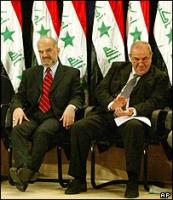







|
News and Information
Shia alliance names PM candidate
| February 22, 2005 |

Ibrahim Jaafari sitting beside Iyad Allawi at their swearing in ceremony last June
Jaafari (left) could replace Iyad Allawi as Iraq's new kingpin
The Shia alliance that won Iraq's national election in January has named Ibrahim Jaafari as its candidate for the position of prime minister.
The nomination came as challenger Ahmed Chalabi dropped his bid for the post, amid pressure from within the group.
The United Iraqi Alliance won 140 seats in the 275-member interim parliament.
Islamic Daawa party leader Mr Jaafari was tipped to get the nomination, but maverick Mr Chalabi - a former US favourite - mounted a late challenge.
"Jaafari is the only one still in contention," said an official from the Supreme Council for the Islamic Revolution in Iraq, one of the main parties in the United Iraqi Alliance, a coalition of 38 mainly Shia parties.
Mr Chalabi was now supporting Mr Jaafari, the official said. The candidate now only faces the challenge from incumbent interim Prime Minister Iyad Allawi.
IBRAHIM JAAFARI
Spokesman for Islamic Daawa Party
Born in Karbala in 1947
Educated at Mosul university as a medical doctor
Lived in Iran and UK since 1980s
A two-thirds majority, or 182 votes, is needed to confirm the appointment of the prime minister, which will be the most powerful position in the transitional government whose job is to write a new constitution for Iraq.
Correspondents say Mr Jaafari would be a popular choice, as he is seen as less corrupt and as having a good relationship with Iran but not as close to the Iranian government as some other Shia politicians.
Opinion polls indicate Mr Jaafari - a moderate Shia Muslim - is the most trusted politician in the country.
As UIA candidate he also has the backing of Grand Ayatollah Ali Sistani, Iraq's most influential religious leader.
Allawi warning
Earlier Mr Allawi warned that the country could fall apart unless the new government promotes national unity.
"We know that a lot of people did not participate [in the election]," Mr Allawi said in a BBC interview.
"We need to find room and ways to put everybody under the tent of national unity."
When Mr Allawi took office last June he repeatedly said security was his main priority, but he acknowledged the job had been "difficult and threatening".
"We started from below zero so really building the security institutions in an environment like Iraq is not easy," he said. "We have deadly enemies."
Despite a slick and well-funded electoral campaign, Mr Allawi's party secured only 40 seats in the transitional parliament, while an alliance of Kurdish parties has 77 deputies.
On Tuesday, attacks by insurgents fighting the Iraqi government and its US military backers underlined the challenges that still lie ahead.
Two Iraqi soldiers were killed and 30 people were wounded by a car bomb that exploded near a convoy leaving Baghdad's fortified Green Zone.
Witnesses said a car bomb also went off near a US military convoy in the restive northern city of Mosul, although there was no reports of casualties. Four US troops were killed in insurgent attacks on Monday. |
Source: www.bbc.com |
| http://news.bbc.co.uk/2/hi/middle_east/4287225.stm |
|
| Support Caprivi Freedom |
Fill out the form below to become a member of this site and receive our regular newsletter.
|

|

